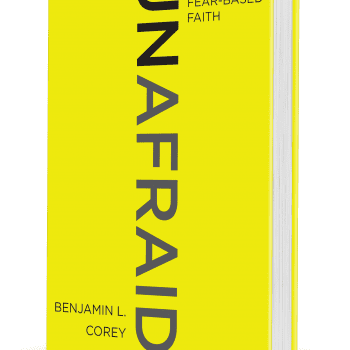So, you’re a sinner.
Just one sin lands you in that category. No matter how small or large of a transgression, that one, smallest sin, comes with it the penalty of an eternity of torment in hell.
One lie. One act of theft. One impure thought. Just one sin earns eternal torment.
Or, so that’s what they taught us.
The more and more I process the traditional view of hell, the more the premise of it all doesn’t even make sense.
When we consider matters of justice, we seem to have an instinctive understanding that consequences should be proportional to the offense. When consequences are meted proportionally, we sense fairness. When consequences dramatically exceed an offense, we instinctively recognize they are an unjust response to the offense.
We even find this lesson in the Bible– when Moses introduced the system of an eye-for-an-eye, he was putting a limit on retributive justice, and teaching that any punishment must be proportional to the offense.
Or, a modern day example: if a child were not taking school seriously and had poor grades, it would be considered fair and just to restrict some extracurricular activities until grades improved. However, if a parent were to respond to these poor grades by grounding them for the next four years, we’d see that as unjust and an overreaction, because the consequence would lack proportionality to the offense. Furthermore, such an action would show the parent was more concerned with punishing the child than actually helping them improve their grades (punitive justice instead of restorative justice).
Those who argue in favor of the traditional view of hell abandon this moral and biblical view of justice being proportional to the offense. Instead, to justify the doctrine of eternal conscious torment, they argue that justice must be proportional to the one offended. Since God is infinite and without end, the punishment for offending him must also be infinite and without end.
In Four Views on Hell, Denny Burk states it this way: “To sin against an infinitely glorious being is an infinitely heinous offense that is worthy of an infinitely heinous punishment.” (p.20)
In fact, to reject this idea that God needs to punish sin with eternal, everlasting torment, is something Burk says represents a “diminished” view of God and is evidence that we are failing to take sin and judgement seriously.
I, of course, couldn’t disagree more strongly.
Those of us who reject the idea of eternal conscious torment do take God and justice quite seriously– so serious in fact, that we recognize injustice when we see it.
We are made in the image and likeness of God. We are given a conscience from God. And that conscience bears witness to the reality that consequences for wrongdoing must be fair and proportional to the offense, not the one offended. For example, we punish murder on the basis of murder itself. The law does not say that the punishment for murdering a kind person should be more harsh than the punishment for murdering an unkind person.
This is also why we don’t burn people alive in town squares anymore. It’s why we find the idea of cutting off someone’s hands for stealing to be repulsive. It’s why we don’t cut off our kid’s tongues when they get caught lying to us.
It’s why we don’t do a lot of things: We know that true justice is always proportional to the offense.
The view of eternal conscious torment is the ultimate case of justice lacking any degree of proportionality. Those who try to overcome the objection of proportionality are unable to do so on the basis of morality, ethics, or even Scripture, since even Scripture prescribes death, not hell, as the penalty for sin (see Genesis 2:17, Ezekiel 18:20, Romans 6:23).
One cannot show that it is morally good to torment someone in flames for billions and billions of years for a stolen piece of bread. One cannot show that it is ethical to torment someone for billions and billions of years for speaking a single lie. And certainly, one cannot make the case from Scripture unless they completely redefine the word death to mean something it doesn’t.
Thus, there is often this appeal to immediately remove God from moral or ethical standards of what our own conscience tells us is right or wrong. We become forced to say, “Yeah, that’s horrible, and I’d never do it to my kid because I love them, but it’s okay when God does it.”
The only way to skirt the issue of proportionality is to essentially dismiss the argument and make up things that are not found in Scripture. This is precisely what Burk does when he claims that God being an infinite being, must thus punish the smallest offense infinitely– the Bible doesn’t say that. It’s an argument from Anselm in the 12th Century, but not from the Bible.
We instinctively know that when punishment lacks proportionality, it is unjust– even the Bible teaches this! Thus, to affirm the traditional view of hell we have to find ways to assuage our dissonance in order to explain away something our conscience and biblical principles tell us is wrong, wrong, wrong.
Instead of trying to do ethical gymnastics to show that it is good and right for God to torment someone for eternity over a stolen slice of bread, we would be better off listening to our God-given consciences which tell us that punishment without proportionality is not justice at all.
(For the full archive on Hell, click here.)
 Dr. Benjamin L. Corey is a public theologian and cultural anthropologist who is a two-time graduate of Gordon-Conwell Theological Seminary with graduate degrees in the fields of Theology and International Culture, and holds a doctorate in Intercultural Studies from Fuller Theological Seminary. He is also the author of the new book, Unafraid: Moving Beyond Fear-Based Faith, which is available wherever good books are sold. www.Unafraid-book.com.
Dr. Benjamin L. Corey is a public theologian and cultural anthropologist who is a two-time graduate of Gordon-Conwell Theological Seminary with graduate degrees in the fields of Theology and International Culture, and holds a doctorate in Intercultural Studies from Fuller Theological Seminary. He is also the author of the new book, Unafraid: Moving Beyond Fear-Based Faith, which is available wherever good books are sold. www.Unafraid-book.com.













